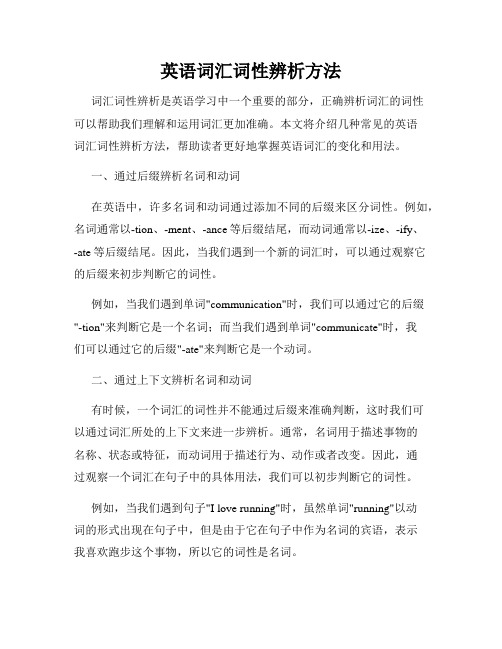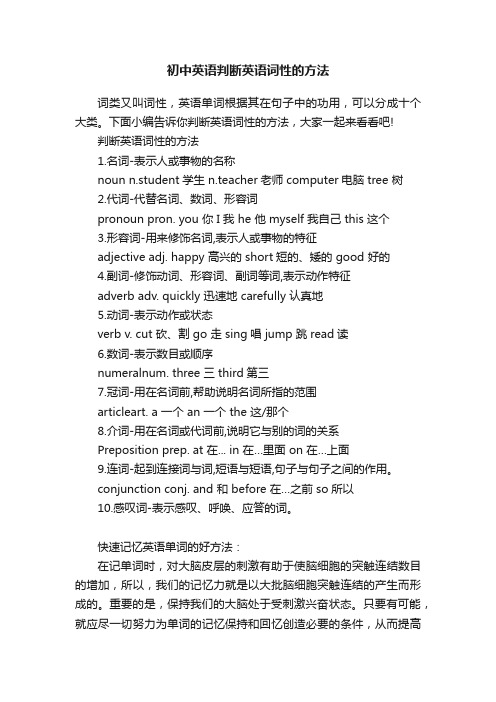英语单词词性判断
由英语单词后缀判定词性

由英语单词后缀判定词性后是一种重要的构法,通后常常可以判断出一个的性。
一个英可以分三个局部:前〔 prefix〕,根〔 stem〕及后〔 suffix 〕。
中位于根前面的局部就是前。
前,可以改的意思。
在言学里,后,又称尾,是一种后置于其他素后的。
后 -名解以英例: establish〔〕 + -ment 〔后〕— > establishment 〔名〕:借由后 -ment 的使用,使原本的素名,言的衍生,是后的一种用途后 -名后常的此后及其具体含如下:1.-ster,-eer,-er〔or 〕意:从事某种或参与某种活的人〔person engaged in anoccupation or activity 〕例:gamester ,gangster,songster,engineer ,profiteer ,mountaineer ,auctioneer ,driver , teacher ,director , actor , professor2.-let 意:小或者不重要的西〔small,unimportant things 〕例: booklet ,leaflet ,starlet3.-ette 意:1〕小的西〔 small〕例:cigarette 2 〕假的西〔 imitation 〕例:leatherette3〕女性〔 female 〕例:usherette4. -ess 意:女性〔 female 〕例: actress, poetess, hostess, paintress5. -hood 意:期〔 status; etc .〕例: boyhood , childhood , manhood6. -ship 意:才能,状,格,品等〔skill, state, condition , status, quality 〕例: leadership , friendship , membership , lectureship ,sportsmanship7.-ful 意:量〔 the amount which noun contains 〕例: cupful , handful , mouthful , spoonful8.-tion ,-ion 意: 1〕状,行等〔 state;action ;etc.〕例: action ,oppression ,possession,education ,starva- tion 2 〕机构等〔institution ;etc.〕例: organization ,foundation 9.-ment 意:状,行等〔state; action; etc.〕例: movement ,enslavement ,pavement10. -al 意:作〔 action 〕例: arrival , refusal, revival , recital , removal11.-age 意:程度,数量等〔extent ; amount ;etc.〕例:wastage,coverage, acreage,shrinkage,breakage, hostage912.-ness;-ity〔 ty〕意:状,品〔 state;quality ;etc .〕例:happiness, usefulness,selfishness,kindness ,rapidity , activity , sanity , changeability13.-ism 意:道,主,学等〔 doctrine of ,practice of 〕例:idealism , impressionism ,absenteeism ,racism后 -后常的此后及其具体含如下:1.-ify 意:,〔 to turn into ,to make or become 〕例: beautify , diversify , simplify2.-ize;-en 意:使⋯⋯,得⋯⋯〔 to make or become;to make into〕例:modernize,popularize , legalize, hospitalize ,symbolize, ripen ,widen , heighten , threaten3.-ate 意:增加,使⋯⋯听写〔 give or add,make or become 〕例:originate , hydrogenate , validate ,differentiate后 -形容后常的此后及其具体含如下:1.-ful 意:充,有〔 full of ;hav- ing;giving;etc.〕例: useful ,pitiful , hopeful ,careful,helpful , forgetful ,thankful , fearful2. -less 意:没有,无〔without ; not giving 〕例: speechless, childless,harmless,hopeless, meaningless ,homeless3.-ly 意:有⋯⋯品的〔having the qualities of 〕例: beastly,manly , brotherly ,friendly4. -like 意:像⋯⋯的〔like〕例:childlike , statesmanlike ,tiger-like5. -y; -ish 意:像⋯⋯一般的〔somewhat like 〕例: meaty , sandy, silky, hairy,leafy, watery , foolish , girlish ,blackish , thinnish6.-some 意:像⋯⋯一的;引起⋯⋯的;有⋯⋯品的〔 like;causing; having thequality of 〕例: troublesome , burdensome , wholesome , tiresome , bothersome 7.-able〔ible 〕意:能⋯⋯的;可以⋯⋯的〔 able to be ;capable〕例: changeable,realiable,readable , drinkable , comfortable ,expansible ,convincible8.-ed 意:有⋯⋯的〔 having,etc.〕例: wooded ,pointed ,moneyed , odd-shaped9.-al 意:有⋯⋯属性的,⋯⋯型的〔 nature of ,typical of 〕例: cultural ,personal,regional ,musical10. -ary〔 ory〕意:属于⋯⋯的,与⋯⋯相的〔: revolutionary , imaginary , contradictory 11. -ous 意:富含⋯⋯的;有⋯⋯品的;像⋯⋯的〔belonging to; connected with 〕例 fullof ; having the quality of ;like〕例: glorious,erroneous , malicious , gracious12.-ic〔 ical〕意:⋯⋯的;属于⋯⋯的〔 typical of ;belonging to 〕例: historic , historical , methodic ,methodical , dramatic , heroic13. -ive 意:有⋯⋯属性的;有某种向的〔having the nature or quality of;given or tending to 〕例: attractive , talkative , restrictive , defensive , preventive ,constructive , sensitive后 -副后常的此后及其具体含如下:1. -ly 意:以⋯⋯方式〔in a...manner ; etc.〕例: happily, boldly , attentive- ly ,strangely2.-ward〔 s〕意:表示方式或作的方向〔manner and direction of movement〕例:onward 〔 s〕, backward 〔s〕, earthward 〔 s〕, homeward 〔 s〕, eastward 〔 s〕3.-wise 意: 1〕按照⋯⋯方式〔 in the manner of 〕例: crabwise,clockwise2〕就⋯⋯而言〔 asfar as ...is concerned〕例: weatherwise,educationwise4.以 ly 后尾的副,比都是 +more ,如 more carefully ,more useful 最高 +most如 most carefully ,most useful。
英语词汇词性辨析方法

英语词汇词性辨析方法词汇词性辨析是英语学习中一个重要的部分,正确辨析词汇的词性可以帮助我们理解和运用词汇更加准确。
本文将介绍几种常见的英语词汇词性辨析方法,帮助读者更好地掌握英语词汇的变化和用法。
一、通过后缀辨析名词和动词在英语中,许多名词和动词通过添加不同的后缀来区分词性。
例如,名词通常以-tion、-ment、-ance等后缀结尾,而动词通常以-ize、-ify、-ate等后缀结尾。
因此,当我们遇到一个新的词汇时,可以通过观察它的后缀来初步判断它的词性。
例如,当我们遇到单词"communication"时,我们可以通过它的后缀"-tion"来判断它是一个名词;而当我们遇到单词"communicate"时,我们可以通过它的后缀"-ate"来判断它是一个动词。
二、通过上下文辨析名词和动词有时候,一个词汇的词性并不能通过后缀来准确判断,这时我们可以通过词汇所处的上下文来进一步辨析。
通常,名词用于描述事物的名称、状态或特征,而动词用于描述行为、动作或者改变。
因此,通过观察一个词汇在句子中的具体用法,我们可以初步判断它的词性。
例如,当我们遇到句子"I love running"时,虽然单词"running"以动词的形式出现在句子中,但是由于它在句子中作为名词的宾语,表示我喜欢跑步这个事物,所以它的词性是名词。
三、通过词义辨析形容词和副词形容词用于修饰名词,描述事物的特征或状态,而副词用于修饰动词、形容词或其他副词,描述行为的方式、程度或频率。
因此,通过观察一个词汇在句子中所起的修饰作用,我们可以初步判断它的词性。
例如,当我们遇到句子"She sings beautifully"时,单词"beautifully"用于修饰动词"sings",描述她的歌唱方式,所以它的词性是副词。
英语词性词汇用法辨析技巧

英语词性词汇用法辨析技巧词性在英语中扮演着至关重要的角色,它可以决定一个单词的用法并在句子中发挥不同的功能。
为了更好地理解和运用英语词汇,我们需要掌握一些辨析词性的技巧。
本文将为大家介绍一些常见的英语词性辨析问题,并提供一些实用的技巧。
1. 名词(Noun)和动词(Verb)的区分名词和动词是英语中最基本的两种词性。
在辨析名词和动词时,可通过以下几个方面来判断:1.1. 句子结构:名词通常以作主语、宾语、表语等角色出现;而动词则表示动作或状态的发生。
例1:The cat runs.(名词作主语)例2:He likes playing tennis.(动词表示动作)1.2. 词义:名词描述事物的名称或实体,而动词则表示行为、状态或事件。
例1:Education is important.(名词描述事物名称)例2:I am learning English.(动词描述动作或状态)1.3. 词形转换:名词和动词之间可以通过词形转换来辨析。
例1:Have you read this book?(名词)例2:I like to read.(动词)2. 形容词(Adjective)和副词(Adverb)的区分形容词和副词也是常见的词性,在辨析时可以考虑以下几个方面:2.1. 修饰对象:形容词通常修饰名词,而副词则修饰动词、形容词或其他副词。
例1:She is a beautiful girl.(形容词修饰名词)例2:He runs quickly.(副词修饰动词)2.2. 词义:形容词描述名词的特征或性质,而副词则描述动作的方式、程度等。
例1:He is a careful driver.(形容词描述特征)例2:She speaks slowly.(副词描述方式)2.3. 词形转换:形容词和副词之间可以通过词形转换来辨析。
例1:She is a quick learner.(形容词)例2:She learns quickly.(副词)3. 介词(Preposition)和连词(Conjunction)的区分介词和连词在句子中具有不同的功能,可以通过以下几个方面来判断:3.1. 连接成分:连词通常用于连接两个句子、短语或单词,起到连接的作用;而介词则与名词或代词搭配使用,表示关系。
英语单词词性转换的基本规律

1.动词(v.)→名词(n.)(a)词形不变,词性改变例如:work, study, water, plant等可以用作动词(工作,学习,浇水,种植),也可以用作名词(工作,学习,水,植物).(b)一些动词在词尾加上-er或-or之后就变成了表示"某一类人"的名词例如:work—worker, teach—teacher, sing—singer,jump—jumper, play—player, learn—learner,visit—visitor, invent—inventor, collect—collector等.注意:1)以不发音的e结尾的动词,在词尾加-r.例如:drive—driver, write—writer等.2)以重读闭音节结尾,且末尾只有一个辅音字母的动词,应双写末尾的辅音字母,再加-er例如:run—runner, win—winner, begin—beginner等.(c)在动词词尾加上-ment 变成名词例如:achieve—achievement (成就)advertise—advertisement//advertising(广告)agree—agreement disgree—disagreementamuse—amusement (娱乐) improve—improvement(争吵) commit(奉献)—commitment develop—development (发展)depart—department (局,部) govern(统治)—government(政府) manage—management (管理) equip—equipment (装备)有些单词比较特殊,需把动词后的e去掉再加ment.例如:argue—argument(争论)(d)在动词词尾加上-(t)ion/(s)ion变成名词例如: attract—attraction; instruct—instruction;invent—invention discuss—discussion;express—expression educate—education;graduate—graduation; operate—operation (去e再加"ion") compete—competition; organize—organization (把e改成其他字母再加"tion") decide—decision conclude—conclusion (把de改为s再加"ion")describe—description描写,描绘 (这是特例,不规则变化)(e)在动词词尾加上-ance变成名词例如: appear—appearance (外貌;出现)perform—performance (演出)accept—acceptance (接受)(f)在动词词尾加-ing变成名词 (方法与动词变为现在分词的方法相同)例如:meet—meeting build—building wait—waitingbathe—bathing say—saying(谚语) mean—meaningend —ending train —training wash—washing注意:以重读闭音节结尾,且末尾只有一个辅音字母的动词,应双写末尾的辅音字母,再加-ing如:swim—swimming shop—shopping begin—beginning(g)其他一些比较特殊的变化例如: Beg(乞讨)—beggar(乞丐) behave(行为举止)—behaviorknow(知道)—knowledge(知识) fly—flight (飞行)heat (加热)—heat(热量) hit (撞击)—hit( 轰动一时的人或物,碰撞)mix (混合)—mixture(混合物) press(按,压)—pressure(压力)sit(坐)—seat (座位) succeed—success(成功)tour—tour(旅游)/ tourist (游客)(h) Arrive-arrival approve-approval survive-survival2.动词(v.)→形容词(adj.)(a)动词后面加able,以e结尾的动词则去e加able,表示具有此性质,特点或属性.例如: afford-affordable;love-lovable(b)动词后面加ed,以e结尾的动词则直接加d,表示被动性的属性或特点.例如: scatter-scattered use-used (赵科翔,注意下,这个就是我们所讲的非谓语动词作定语的情况)(c)不规则的动词则必须记忆,记住其过去分词形式.规律不大,意义同(b).3.名词(n.)→形容词(adj.)(a)在名词后面加-y可以变成形容词(尤其是一些与天气有关的名词)例如: rain—rainy, cloud—cloudy, wind—windy, snow—snowy,health—healthy, luck—lucky, anger—angry guilt—guilty(内疚的)tourist—touristy(游客多的) , salt (盐)—salty (咸的)silk(丝绸)—silky(丝绸般的), sleep—sleepy (昏昏欲睡的)注意:1)如果以重读闭音节结尾,且词尾只有一个辅音字母,这时应双写辅音字母再加"-y".如: sun—sunny, fun—funny, fog—foggy(有雾的), fur—furry(毛皮的)2)少数以不发音的e结尾的名词变为形容词时,应去掉e再加"-y".如: noise—noisy, ice—icy, shine—shiny(发亮的), taste(口味)—tasty(甜的)(b)名词后面加-ed,以e结尾的直接加d.例如: spot(斑点)—spotted(有斑点的); talent—talented (有天赋的) organize—organized 有组织的; balance—balanced(平衡的)(c)一些抽象名词在词尾加-ful可以变为形容词例如:care—careful, thank—thankful, help—helpful,use—useful, meaning—meaningful(d)在名词后加-less构成含有否定意义的形容词例如:care—careless(粗心的), use—useless(无用的)hope—hopeless(没希望的),home—homeless(无家可归的)(e)一些以-ce结尾的名词,把-ce改为-t变成形容词例如: difference—different, silence—silent, confidence—confident(f).在名词后加-ly变为形容词例如: friend—friendly, love—lovely, live---lively(g).在名词后加-ous变为形容词例如: danger—dangerous(h)名词后面加-al变为形容词例如: music—musical; medicine—medical (这个比较特殊)(i)名词后面加-able变为形容词,如果以e结尾就去e再加"-able".例如: adjust—adjustable 可调整的 value—valuable有价值的(j)名词后面加-en变成形容词例如: wood—wooden 木制的 wool—woolen 羊毛的(k)一些表示国家的名词可以在词尾加-ese, -ish或-n构成表示国籍,语言的形容词例如: China—Chinese, Japan—Japanese, England—English,America—American, India—Indian, Australia —Australian(注意Canada—Canadian)4.形容词(adj.)→副词(adv.)▲一般在形容词的词尾加-ly可以变成副词例如: quick—quickly, slow—slowly, loud—loudly, sudden—suddenly 等但是,以下几点值得注意:(a) 一些以"辅音字母+y"结尾的形容词,要把y改为i再加-ly例如: happy—happily, angry—angrily, lucky—luckily, heavy—heavily, noisy—noisily(b) 有些以-ble或-le结尾的形容词,去掉e加-y例如:possible—possibly, terrible—terribly(c)少数以e结尾的形容词,要去掉e再加-ly例如: true—truly但绝大多数以e结尾的形容词仍然直接加-ly 例如: polite—politely, wide—widely (d)以-l结尾的形容词变为副词时要在词尾加-ly,以-ll结尾的才在词尾只加-y.例如: usual—usually, careful—carefully, useful—usefullyfull—fully (以-ll结尾的才只加y)单词意义短语、例句advice建议give sb. some advice on sth. equipment a set of equipmentexperience经验(注:“经历”可数)Mr. Li has much teaching experience. exercise锻炼(注:“练习”可数)take exercisefun开心、快乐的事What fun it is to do sth.!furniture家具 a set of furniturenews/information /word 消息,新闻Word came that he won the first prize in thematch.baggage/luggage行李 a piece of baggage/luggageprogress进步make great/rapid/some/no progress in sth. practice练习Practice makes perfect.work工作weather天气applause掌声 a burst of applause 一阵掌声wealth财富,富裕friendship友谊energy精力homework家庭作业knowledge知识nature自然luck运气health健康technology技能courage勇气help帮助hope希望food食物wood木材scenery风景jewelry珠宝poetry诗歌evidence证据(。
英语单词词性

英语单词词性英语里的词汇分为10种词性,分别是:n.名词v.动词pron.代词adj.形容词adv.副词num.数词art.冠词prep.介词conj.连词int.感叹词。
可分为两大类:实词:表示实在意义的词,有名词、动词、形容词、数词、量词、代词、副词.虚词:不表示实在意义而表示语法意义的词,有:介词、连词、助词、叹词.词性一、单词词性(一)、名词(nouns)n.名词是词性的一种,也是实词的一种,是指代人、物、事、时、地、情感、概念等实体或抽象事物的词。
名词可以分为专有名词(Proper Nouns和普通名词(Common Nouns)。
专有名词是某个(些)人,地方,机构等专有的名称,如Beijing,China等;普通名词是一类人或东西或是一个抽象概念的名词,如:book,sadness等。
1、可数名词的复数形式名词复数的规则变化:一般加s或es名词复数的不规则变化:1)child---children foot---feet tooth---teeth mouse---mice man---menwoman---women2)单复同形如:deer,sheep,fish,Chinese,Japanese3)集体名词,以单数形式出现,但实为复数。
如: people police cattle 等本身就是复数,不能说 a people,a police,a cattle,但可以说a person,a policeman,a head of cattle, the English,the British,the French,the Chinese,the Japanese,the Swiss 等名词,表示国民总称时,作复数用。
2、名词的格在英语中有些名词可以加"'s"来表示所有关系,带这种词尾的名词形式称为该名词的所有格,如:a teacher's book。
英语单词词性和判断技巧(2)

英语单词词性词性尾缀其实很多,大家主要记住最常用的1. 名词后缀1)-or/er/ess/crat/cis:做某件事情或职业的人或物:worker, debtor2)-acy, 表示"性质,状态,境遇" democr acy, accura cy, diplom acy3)-ance, -ence表示"性质,状况,行为,过程,总量,程度” import ance, dilige nce, differ ence, obedie nce4)-ancy, -ency, 表示"性质,状态,行为,过程" freque ncy, urgenc y, effici ency,5)-bility, 表示"动作,性质,状态" possib ility, flexib ility, feasib ility,6)-dom, 表示"等级,领域,状态" freedo m, kingdo m, wisdom7)-hood, 表示"资格,身份, 年纪,状态" childh ood, manhoo d, falseh ood8)-ion, -sion, -tion, -ation, -ition,表示"行为的过程,结果,状况" action, soluti on, conclu sion, destru ction, expres sion, correc tion9)-ism, 表示"制度,主义,学说,信仰,行为" social ism, critic ism, colloq uiali sm, herois m10)-ity, 表示"性质,状态,程度” purity, realit y, abilit y, calami ty11)-ment, 表示"行为,状态,过程,手段及其结果 treatm ent, moveme nt, judgme nt, punish ment, argume nt12)-ness, 表示"性质,状态,程度" goodne ss, kindne ss, tiredn ess, friend lines s13)-ship, 表示"情况,性质,技巧,技能及身份,职业” hardsh ip, member ship, friend ship14)-th, 表示"动作,性质,过程,状态" depth, wealth, truth, length, growth15)-tude, 表示"性质,状态,程度" latitu de, altitu de(海拔)16)-ure, 表示"行为,结果" exposu re, pressu re, failur e, proced ure(手续),17-grapy,表示"……学,写法” biogra phy, callig raphy, geogra phy18)-ic, ics, 表示"……学……法" logic, mechan ics, electr onics, lingui stics19)-ology,表示"……学……论”biolog y, zoolog y, techno logy(工艺学)20)-nomy, 表示"……学……术" astron omy, econom y, bionom y(生态学)2. 形容词后缀(1)带有“属性,倾向,相关”的含义1)-able, -ible, visibl e, flexib le2)名词-ish, foolis h, bookis h, selfis h(注意accomplis h, vanish)3)-ive, active, sensit ive, produc tive4)-like, manlik e, childl ike5)名词-ly, manly, father ly, schola rly, mother ly6)-some, troubl esome, handso me7)-ful, beauti ful, wonder ful, helpfu l, truthf ul8)-ous, danger ous, genero us, courag eous, variou s9)-ent, violen t10)-most, foremo st, topmos t11)less, 表示否定,countl ess, stainl ess, wirele ss3. 动词后缀1)-ize, ise, 表示"做成,变成,……化“modern ize, mechan ize, democr atize, organi ze2)-en, 表示"使成为,引起,使有” quicke n, weaken, soften, harden3)-fy, 表示"使……化, 使成”beauti fy, purify, intens ify, signif y, simpli fy4)-ish, 表示"使,令” finish, abolis h, dimini sh, establ ish5)-ate, 表示“成为……,处理,作用” separa te, operat e, indica te4. 副词后缀(形容词)-ly:bad→badly坏地/恶劣地,carefu l→carefu lly小心地-wise(OE):clock→clockw ise(a./adv.)顺时针方向的(地);like→likewi se同样地-wards:out→outwar ds向外面地,north→northw ards向北方地单词词性判断可以在词义的理解及书写句子方面帮助学生。
英语单词词性-怎样分辨英语单词词性

一.名词(Noun.N)1 .定义:人、地、物、事或观念等名称叫做名词。
人:Edison(爱迪生),Helen(海伦),Mr .Wang(王先生)地:Asia(亚洲),China(中国),New York(纽约)物:book(书),dog(狗),tree(树),water(水)事或观念:work(工作),music(音乐),truth(真理)注:(1).如人名、地名、国名等属于该名称持有者专用的名称,其第一字母必须大写,如Edison,New York,China。
(2).名词亦有可数和不可数之分,如果是可数的就有单数和复数的区别。
-s,e s,ies,⋯”所谓复数就是多于一个的意思,通常是在单数名词的词尾加“以示其为复数。
例如:a book(一本书)two books(两本书)one boy(一个男孩)some boys(一些男孩)one girl(一个女孩)many girls(许多女孩)名词在句子中的主要功能如下:(1)作句子的主语,例:Miss Lin is our English teacher.(林小姐是我们的英语老师。
)(2)作句子的表语或宾语补语,例:John and Tom are good friend.s(约翰和汤姆是好朋友。
—表语)I call my puppy “Luck”.(我叫我的小狗“来福”。
—宾语补语)(3)作动词的直接宾语或间接宾语,例:He gave me an apple.他( 给了我一个苹果)(4)作介词的宾语,例:You can go by taxi.(你可以乘出租车去。
)2 .名词单复数-单数变复数绝大多数的可数名词的复数形式,是在该词末尾加上后辍-s。
读音变化:结尾是清辅音读[s],结尾是浊辅音或元音读[z]。
例:friend→friends; cat→cats; style→styles; sport→sports; piece→pieces 凡是以s、z、x、ch、sh结尾的词,在该词末尾加上后辍-es构成复数。
初中英语判断英语词性的方法

初中英语判断英语词性的方法词类又叫词性,英语单词根据其在句子中的功用,可以分成十个大类。
下面小编告诉你判断英语词性的方法,大家一起来看看吧!判断英语词性的方法1.名词-表示人或事物的名称noun n.student学生 n.teacher老师 computer电脑 tree 树2.代词-代替名词、数词、形容词pronoun pron. you 你 I 我 he 他 myself 我自己 this 这个3.形容词-用来修饰名词,表示人或事物的特征adjective adj. happy 高兴的 short短的、矮的 good 好的4.副词-修饰动词、形容词、副词等词,表示动作特征adverb adv. quickly 迅速地 carefully 认真地5.动词-表示动作或状态verb v. cut 砍、割 go 走 sing唱 jump 跳 read读6.数词-表示数目或顺序numeralnum. three 三 third第三7.冠词-用在名词前,帮助说明名词所指的范围articleart. a 一个 an 一个 the 这/那个8.介词-用在名词或代词前,说明它与别的词的关系Preposition prep. at 在... in 在…里面 on 在…上面9.连词-起到连接词与词,短语与短语,句子与句子之间的作用。
conjunction conj. and 和 before 在…之前 so所以10.感叹词-表示感叹、呼唤、应答的词。
快速记忆英语单词的好方法:在记单词时,对大脑皮层的刺激有助于使脑细胞的突触连结数目的增加,所以,我们的记忆力就是以大批脑细胞突触连结的产生而形成的。
重要的是,保持我们的大脑处于受刺激兴奋状态。
只要有可能,就应尽一切努力为单词的记忆保持和回忆创造必要的条件,从而提高单词的记忆效率。
为达此目的,可采取以下途径和方法:(1)制定一个记忆单词的学习计划,有计划有目的地增加大脑对外语信息的记忆容量;(2)尽一切可能参加能增强记忆力的各项活动,随时随地地说外语,用外语,利用一切机会人为地创造语言环境;(3)做到在单词的记忆保持效果趋于下降之前及时进行复习;(4)要更多地使用你的右脑,即通过实物、画图、模型和颜色充分发挥能增强你记忆的那个大脑半球的作用。
- 1、下载文档前请自行甄别文档内容的完整性,平台不提供额外的编辑、内容补充、找答案等附加服务。
- 2、"仅部分预览"的文档,不可在线预览部分如存在完整性等问题,可反馈申请退款(可完整预览的文档不适用该条件!)。
- 3、如文档侵犯您的权益,请联系客服反馈,我们会尽快为您处理(人工客服工作时间:9:00-18:30)。
单词词性判断可以在词义的理解及书写句子方面帮助学生。
名词有四数:可数与不可数,单数或复数;限定与动词不可忘。
四数加限定!一.怎样确定名词:一般情况下在下列结构中我们可确定所缺空应为名词◇1.a/an/the +(adj.)+ 名词;a/the book; the rich the disabled the Smiths◇2.adj.+名词; a big stone; a long river; interesting books◇3.adv.+ adj.+名词; a very honest boy◇4.介词+名词;in the room; under construction◇5.形容词性物主代词+名词;my surprise; his honesty◇6. 数词+名词;five girls;◇7.缺的词在句中为主语,表语,宾语时多为名词。
They have books.及时练习1:1.There has been a 30% growth in the ____(市场) for personal computers.3.He has discovered a lot of ___________ (发现) in science .5.I am sorry that I can’t attend the __________(讲座) on American history . 6.She started as a successful merchant but ended up as a __________(乞丐). 7.There was a surprised _____________(表情)on her face .8.Our city has experienced great ___________(变化)in the past few years 9.Please give my _________(祝贺)when you see her .10.Jack took a deep _____________ (呼吸)and then dived into the water.11.Oliver was unable to give police a ______________(描述)of his attack .12.The car was a ____________(廉价货)at the price.动词→名词练习:achieve add argue arrive respondretire rude save sail sell 1. market 3 discoveries 5.lecture 6 beggar 7. expression 8 changes 9. congratulations 10. breath 11. description 12. bargain及时练习2:指出下列文中的名词:In the early 1990s, the word “Internet”was strange to most people. But today, Internet has become a useful tool for people all over the world. Maybe Internet has been the greatest invention in the field of communication in the history of mankind (人类).Communicating with others on the Internet is much faster. We can chat with a person who is sitting in the other part of the world. We can e-mail our friends and they can read the e-mails within a minute.Giving all kinds of information is probably the biggest advantage of the Internet. We can use search engines to find the information we need. Just type in a keywordor keywords and the search engine will give us a list of suitable websites to look at.We can enjoy a lot on the Internet by downloading games, visiting chat rooms or surfing (浏览)websites. There are some games for free. We can meet new and interesting people in the chat now. We can also listen to music and see films. 二.怎样确定名词的单数或复数;可数或不可数§ 确定名词单数或复数的方法:1.由名词前面的数词: 1. I have several ______ (书) on the shelf. 2. This bus can carry 60 (乘客).2.由名词后的动词单数或复数(即主谓一致): The _____ (建议) are reasonable and some of us will accept them.3.由句意: Our ______ (教授) held a meeting about how to improve our English.What is the best-known chain of fast-food (餐馆)in the world. ※及时练习3:判断下列名词正误:1. They often have fish, meat and vegetable for supper.2. Mrs. Smith gets well along with her neighbor.3. They had only three meal of soup every day.4. Dickens wrote Oliver Twist in the year 1837 - 1838.5. His new play was a great succeed.6. The animals are useful to the desert people in many way.7. As he explored the sea,he took picture and videos of many thing that people had never seen before.8. They were given kinds of breakfast,and sometimes they got no breakfast at all.9. School child walked with their shirts,coats and anything else they could find pulled up over their nose.10. The middle part of the 20th century brought new ways to help people get over disease.11. Too many trees have been cut this years.12. They use camels for carrying water,food,tents and another things.注意三类名词:1、总是不可数的名词:1) 物质名词:furniture, equipment,2) 抽象名词:advice, progress, news, fun, truth, milk, ink, rice, …2. 根据名词本身的意义:1) 物质名词:water(水, rain (雨水一场雨2) 抽象名词:experience(经验愉快乐事success(成功failure(失败失败的人或事pity(遗憾遗憾的事惊讶3. 个体名词总是可数名词:book, desk,三.限定词:限定词是位于名词或名词词组之前,对他们在特指、泛指或数量等方面起限定作用的一类词。
She showed a certain elegance. The judge divorced the couple. He has got some brains(智慧)!限定词与形容词的区别主要是:限定词只对名词起限定作用(有些限定词也可用作其他词性,如代词等),而形容词则描述名词的特征、状态等:We lived in small house. → We lived in a small house.house 是个体名词,一般来说,个体名词是可数名词,有单数复数形式,单数形式的个体名词(可数名词)除在部分习语或固定搭配中外,一般不可单独使用,须根据具体情况与冠词、不定代词、指示代词或其它限定词连用, 或使用其复数形式。
练习:改正下列错误:1. She should be able to get job in Europe.2. Mr. Blake was considered excellent music teacher.3. How did accident happen?4. I will give you other chance to prove yourself.5. Do you have class this morning?6. Important product of South Africa are fruit and gold.7. She is English teacher.由于动词在句中有谓语和非谓语两种形式,可根据所缺单词在句中充当的成分来判断此处是否为动词。
一.一般情况下:◇1. is, am, are, was, were,◇2. will (would), can (could), must, may, …◇3. has…, have…, had…,don’t, didn’t, doesn’t…◇4. V+s: goes, likes, …◇5. 动词原型:want / go /以上4项为确定的谓语动词。
